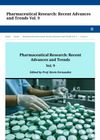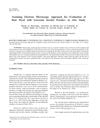 2 citations,
December 2023 in “Current Pharmaceutical Biotechnology”
2 citations,
December 2023 in “Current Pharmaceutical Biotechnology” Nanocarriers can improve the effectiveness of herbal medicines in treating colorectal cancer.
 3 citations,
February 2023 in “ACS omega”
3 citations,
February 2023 in “ACS omega” Grape seed oil improved hair quality the most, followed by rosehip and safflower seed oils, and reduced damage from shampoo.
The research confirmed the identity and quality of seven medicinal plants, aiding in their proper use in herbal medicine.
20 citations,
June 2021 in “British Journal of Dermatology” Use antimalarials like hydroxychloroquine for cutaneous lupus, avoid herbal supplements, and focus on lifestyle changes like sun protection.
September 2022 in “The Korean Tea Society” Houttuynia cordata compounds may help with anti-aging and hair loss.
 7 citations,
January 2018 in “Skin appendage disorders”
7 citations,
January 2018 in “Skin appendage disorders” The document suggests recognizing "trichiatrists" as doctors specializing in hair and scalp health, using evidence-based treatments.
 January 2023 in “Brazilian Journals Editora eBooks”
January 2023 in “Brazilian Journals Editora eBooks” Pharmacists play a key role in managing the use of anxiety medications and ensuring patients use them correctly.
 5 citations,
October 2021 in “Journal of Ovarian Research”
5 citations,
October 2021 in “Journal of Ovarian Research” Cinnamon can help manage symptoms of polycystic ovary syndrome, improve menstrual cycles and fertility, and positively affect cholesterol and blood sugar levels, but more research is needed to confirm these effects and find the best dosage.

The combination of binahong leaf and lemongrass extracts effectively fights dandruff-causing fungus.
Some Himalayan plants with higher antioxidant activity can promote hair growth better.
 December 2022 in “The Journal of Multidisciplinary Research”
December 2022 in “The Journal of Multidisciplinary Research” The polyherbal hair gel with guava leaves, amla, and aloe is effective for scalp health and treating fungal infections.
 5 citations,
August 2014 in “Pharmaceutical Development and Technology”
5 citations,
August 2014 in “Pharmaceutical Development and Technology” Propylene glycol and ethanol increase finasteride skin absorption, sodium lauryl sulfate doesn't.
19 citations,
July 2009 in “PubMed” Green tea extract for hair loss may cause liver damage.
26 citations,
January 2002 in “Advances in experimental medicine and biology” Finasteride, originally for prostate issues, also treats hair loss, similar to effects from certain plants.
 1 citations,
June 2023 in “Pharmacognosy Research”
1 citations,
June 2023 in “Pharmacognosy Research” Bacopa monnieri, or Brahmi, is a traditional herb that may improve memory and treat various conditions, but more research is needed.
 June 2006 in “The American Journal of Cosmetic Surgery”
June 2006 in “The American Journal of Cosmetic Surgery” Advancements in cosmetic and reconstructive surgery improve techniques and patient satisfaction.
1 citations,
January 2006 in “Journal of Acupuncture Research”  May 2023 in “Al-Mağallaẗ al-ʻirāqiyyaẗ li-l-ṣaydalaẗ”
May 2023 in “Al-Mağallaẗ al-ʻirāqiyyaẗ li-l-ṣaydalaẗ” High doses of rosemary extract can harm the liver, kidneys, and reproductive organs in young rats.
 February 2024 in “Journal of ayurveda and integrated medical sciences”
February 2024 in “Journal of ayurveda and integrated medical sciences” Ayurvedic herbs can help manage Polycystic Ovarian Syndrome (PCOS).

Maidenhair fern has traditional and modern uses for treating hair loss and other health issues.
 4 citations,
August 2015 in “Medical Hypotheses”
4 citations,
August 2015 in “Medical Hypotheses” The conclusion suggests that the hormone ghrelin might link acid reflux to oily skin.
 3 citations,
January 2019 in “Therapeutic advances in urology”
3 citations,
January 2019 in “Therapeutic advances in urology” WS PRO 160 I 120 mg effectively treats urinary symptoms from BPH with good safety and tolerability.
 July 2024 in “International Journal of Ayurvedic Medicine”
July 2024 in “International Journal of Ayurvedic Medicine” Certain compounds from Kushtakudori ennai may help treat hair loss.
 3 citations,
October 2014 in “Pharmaceutical Development and Technology”
3 citations,
October 2014 in “Pharmaceutical Development and Technology” The study found a way to improve a skin-applied minoxidil formula using a specific design method.
 4 citations,
January 2019 in “Annals of Dermatology”
4 citations,
January 2019 in “Annals of Dermatology” RE-ORGA, a Korean herb extract, may help prevent hair loss.
 2 citations,
September 2019 in “South Asian research journal of pharmaceutical sciences”
2 citations,
September 2019 in “South Asian research journal of pharmaceutical sciences” Heavy metals in personal care products can cause serious health issues like cancer and hair loss.
 8 citations,
November 2019 in “International Journal of Morphology”
8 citations,
November 2019 in “International Journal of Morphology” Henna dye improves hair cuticle and thickness but effects vary by hair type and health.
 46 citations,
August 2019 in “Journal of Ethnopharmacology”
46 citations,
August 2019 in “Journal of Ethnopharmacology” Eclipta prostrata has many traditional uses and health benefits, but more research is needed to understand how it works and ensure it's safe.
 59 citations,
October 2012 in “Pharmaceutical Research”
59 citations,
October 2012 in “Pharmaceutical Research” Squalene-based carriers improve delivery of a treatment to hair follicles for alopecia areata.
 July 2023 in “Clinical, cosmetic and investigational dermatology”
July 2023 in “Clinical, cosmetic and investigational dermatology” Plica neuropathica can be a sign of schizophrenia and improves with antipsychotic treatment.























